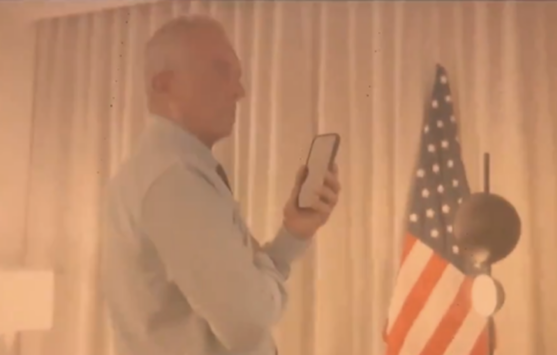In a leaked phone call with independent presidential candidate Robert F. Kennedy Jr., former President Donald Trump incorrectly suggested that childhood vaccine doses are too large and are dangerous to kids.

Referring to a “massive” vaccine “that is like 38 different vaccines” and “looks like it’s meant for a horse” rather than a baby, Trump claimed in a video clip of the call that was shared online to have seen “too many times” vaccinated children “all of a sudden starting to change radically.”
Although Trump didn’t specify the “sudden” changes, the former president is likely referring to the long-debunked notion that vaccines cause autism, a falsehood he has previously shared. Furthermore, no childhood vaccine or combination of vaccines targets 38 diseases at once. There’s no evidence that the current vaccination schedule is harmful to children.
Trump’s false claims about vaccines immediately preceded an apparent offer to work in some way with Kennedy, who is well known for his anti-vaccine views. Trump also discussed aspects of the attempt on his life at a campaign rally on July 13.
Neither presidential campaign responded to requests for comment and clarification.
The Leaked Call
The video clip of the phone call, which runs under two minutes and shows Kennedy speaking to Trump over speakerphone, was first shared by Kennedy’s son Robert “Bobby” Kennedy III, on X, the Washington Post reported. Amaryllis Fox Kennedy, the wife of Bobby Kennedy III, is Kennedy’s campaign manager.
According to a screenshot of his original post, Bobby Kennedy III shared the clip of the call, which he said occurred on July 14, because he was upset that Trump had chosen Sen. JD Vance of Ohio as his running mate over his father. “He could have picked a unity ticket instead he picked JD ‘fire all the unvaccinated nurses’ Vance,” he wrote, alluding to a 2022 tweet from Vance about overwhelmed hospitals that included the line, “let’s fire thousands of nurses who refuse to get the vaccine.”

Bobby Kennedy III, however, seems to have misunderstood that Vance, who has a record of opposing COVID-19 vaccine mandates, was being sarcastic in the tweet. Bobby Kennedy III subsequently removed his post with the video “for mistaking sarcasm for real life,” he said on X. But the video had already spread online and remains available on news sites, including NBC News and CNN.
On July 16, when the clip went viral, Robert F. Kennedy issued an apology. “When President Trump called me I was taping with an in-house videographer,” he wrote on X. “I should have ordered the videographer to stop recording immediately. I am mortified that this was posted. I apologize to the president.”
“I agree with you, man. Something’s wrong with that whole system,” Trump said at the beginning of the video, presumably referring to vaccination. “Remember, I said you want to do small doses. Small doses.”
“When you feed a baby, Bobby, a vaccination that is like 38 different vaccines, and it looks like it’s meant for a horse, not a, you know, 10-pound or 20-pound baby. It looks like you should be giving a horse this … And did you ever see the size of it, right? You know, it’s this massive,” Trump continued, trailing off. “And then you see the baby all of a sudden starting to change radically. I’ve seen it too many times. And then you hear that it doesn’t have an impact, right? But you and I talked about that a long time ago.”
“Yeah,” Kennedy replied.
Trump then appeared to want to collaborate with Kennedy in some capacity. “Anyway … I would love you to do something,” he said. “And I think it would be so good for you. And so big for you. And we’re going to win. We’re going to win. We’re way ahead of the guy.”
Trump proceeded to recount how Biden had called him after the assassination attempt, saying the bullet that grazed him sounded like “the world’s largest mosquito.” The video abruptly ends with Trump commenting on the type of weapon used to shoot him — “an AR-15 or something,” he said, adding, “pretty tough guns, right?”
Throughout the clip of the call, Kennedy was largely silent, only occasionally responding.
Trump’s Vaccine Falsehoods
Trump’s comments in the leaked call are similar to his previous false statements about vaccines.
For example, in a 2015 Republican primary debate, he recounted an anecdote about a toddler who was vaccinated, developed a fever and went on to develop autism. During that debate, he also advocated “smaller doses over a longer period of time” and used his favored equine language to describe vaccines.
“I mean, it looks just like it’s meant for a horse, not for a child, and we’ve had so many instances, people that work for me,” he said.
Earlier in the decade, he also was preoccupied with vaccine dose sizes or combinations.
“Massive combined inoculations to small children is the cause for big increase in autism,” he falsely declared in a 2012 tweet.
Two years later, he insisted in a tweet that he wasn’t against “vaccinations for your children,” but was against vaccinations “in 1 massive dose.” “Spread them out over a period of time & autism will drop!” he added.
There has been intense scientific investigation into the issue, and there is no evidence that vaccines cause autism. In fact, a significant body of work refutes the idea — first proposed by a now-retracted and fraudulent study — with study after study failing to find a link. The rise in autism cases in the last several decades is in large part thought to be due to awareness of the condition and changes in how it is defined.
Similarly, there is no evidence that the current vaccine dose sizes or combination vaccines are hazardous to children or that additional “spacing out” of vaccines is needed. As with all medical products, vaccines are not 100% safe, but serious side effects are rare. Deviating from the immunization schedule is risky because children go unprotected and can contract diseases before they are vaccinated.
Children, of course, do not receive all their vaccines in a single dose. As the Children’s Hospital of Philadelphia explains, the number of vaccines given to children has grown over time, as scientists have developed more vaccines that target more diseases, which ultimately prevents more childhood illness. In the process, several combination vaccines have also been developed, which reduces the total number of shots kids need.
For example, perhaps the best-known combination vaccine is the MMR vaccine, which protects against measles, mumps and rubella. There’s also the DTap vaccine, which protects against diphtheria, tetanus and whooping cough. Sometimes children will receive as many as six shots in a single medical visit, CHOP notes. But no shot or combination of shots given in a single doctor’s visit protects against 38 different diseases. In fact, a child given all the vaccines recommended by the Centers for Disease Control and Prevention by 2 years of age will be protected against 14 diseases (15 if including COVID-19).
Getting several vaccines at once isn’t a problem. “A number of studies have been done to look at the effects of giving various combinations of vaccines, and when every new vaccine is licensed, it has been tested along with the vaccines already recommended for a particular aged child. The recommended vaccines have been shown to be as effective in combination as they are individually,” the CDC explains on a webpage about multiple vaccinations. “Sometimes, certain combinations of vaccines given together can cause fever, and occasionally febrile seizures; these are temporary and do not cause any lasting damage.”
Contrary to Trump’s suggestion that vaccine doses are too big for children, vaccines are designed to contain the smallest amount of antigen, or active ingredient, needed to mount a protective immune response. Typically, antigens are killed or weakened virus or bacteria, or only a piece of a pathogen, such as a viral protein. This means they actually contain very little antigen relative to an infection — with the added bonus that a person doesn’t need to get sick to develop immunity. (As we’ve written before, with vaccination, age is what matters for dose — not weight.)
“All vaccines expose recipients to a smaller number of antigens (parts of viruses or bacteria that generate an immune response) than the actual virus or bacteria,” CHOP’s website explains. “Even when multiple vaccines are given together, the number of antigens is limited compared with the number of pathogens to which infants are exposed during a normal day. The difference is we know when our children were exposed to antigens through a vaccine, but we aren’t always aware of their exposures to diseases.”
The benefits of vaccines are clear. Globally, childhood vaccinations prevent some 4 million deaths a year, according to the CDC. And in many places, such as the U.S., vaccines have made many childhood illnesses largely a thing of the past. That includes measles, mumps, rubella and chickenpox, as well as polio, which in mid-century America killed or paralyzed thousands of children a year.
Update, Aug. 23: Independent presidential candidate Robert F. Kennedy Jr. suspended his campaign on Aug. 23 and encouraged his supporters in key swing states to vote for former President Donald Trump.
Editor’s note: FactCheck.org does not accept advertising. We rely on grants and individual donations from people like you. Please consider a donation. Credit card donations may be made through our “Donate” page. If you prefer to give by check, send to: FactCheck.org, Annenberg Public Policy Center, P.O. Box 58100, Philadelphia, PA 19102.